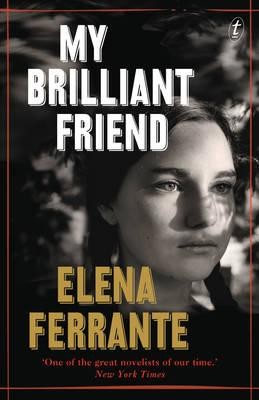
I’ve been wanting to read this FOREVER (three years) but kept putting it off: it’s the first in a series of novels and I wanted to wait until they were all available to binge on. I thought I’d made it, and only realised this morning that although the fourth and final one has been published, the English translation won’t be available till October. Bummer.
And it is a bummer, because I would happily put my life on hold and do nothing but read these novels. They essentially amount to an epic whose subject-matter is the lifelong friendship between two women from Naples, and this, the first, deals with their childhood and adolescence. The series is known as the “Neopolitan novels”, and I assumed that this was just a convenient way of referring to the books by their location – that Naples was, essentially, a neutral site. Well, Naples in the broader sense might be (though there is a lot of pizza consumed), but the neighbourhood in which the girls grow up, in the aftermath of World War II, is an essential shaper of their lives. The poverty of its inhabitants saturates it, and is inextricably linked, as Lila, the protagonist’s best friend, is aware, with the constant violence that surrounds them throughout their childhood. The sense of menace this gives rise to is beautifully realised, the violence being somehow both casual and ritualised: as children, wariness becomes second-nature, and it is always clear when certain combinations of words will set off a chain reaction that leads to confrontation. This violence is always masculine, and Lila distinguishes herself by being the only woman (girl) in the narrative who takes it on herself to meet violence with violence.
Overall, it’s not a great time and place to be a girl. To permit a girl to attend middle school when she could be helping her mother or earning a living is considered a wasteful indulgence; girls are not sufficiently valuable that their education is an end in itself. When a teacher suggests that Elena, the narrator, could attend high school, neither she nor her friend have ever heard that such a thing even existed. It might be the 20th century, but it’s still clear that, in this world, the only way for a girl to escape the drudgery of her family and her poverty is through a different kind of bondage: marriage.
All of that sounds pretty bleak, and it is, but the inner lives of the two main characters bring the world to life and fight against it. Lila embodies a spirit of rebellion and resistance, and is clearly the more intelligent of the two despite her lack of education. The glimpses we get of the way in which she processes her world make it clear that she is determined not just to understand it, but to use that knowledge against it. Elena is closer to a conformist, accepting her environment on its face, seeking to escape it rather than overcome it.
It’s a beautiful book. I know it’s not the first to examine female friendship in depth, but set against a literary world that is still inclined to view male relationships as more suited to serious examination, it’s like a gulp of oxygen. The relationship it portrays is passionate, comforting, complex, and nuanced, like human interactions are, and the writing is beautifully detailed without losing pace. I’m determined now to wait before continuing with the rest, but I’m not sure how long I’ll realistically hold out.